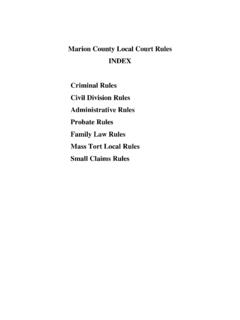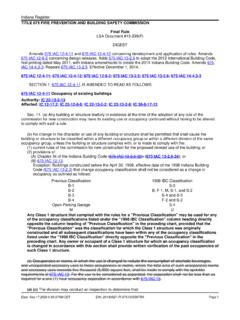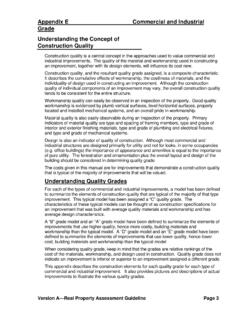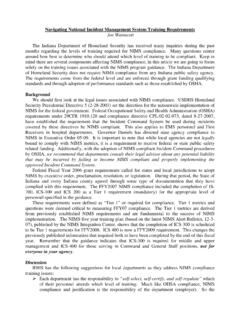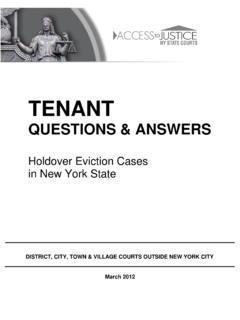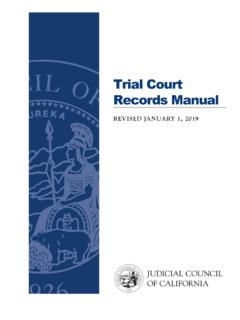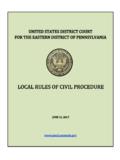Transcription of Local Court Rules - Indiana
1 Marion County Local Court Rules INDEX. Criminal Rules Civil Division Rules Administrative Rules Probate Rules Family Law Rules Mass Tort Local Rules Small Claims Rules Marion Superior Court Criminal Rules RANDOM ASSIGNMENT OF CRIMINAL CASES. CASE CONSOLIDATION. LR49-CR23-102 RECORDS. LR49-CR00-103 GRAND JURY. LR49-CR00-104 SPECIAL GRAND JURY. LR49-CR00-105 TRIAL Rules . APPEARANCE AND WITHDRAWAL OF. COUNSEL. LR49-CR00-107 DISCOVERY. LR49-CR00-108 BAIL. LR49-CR20-109 CONTINUANCES, INITIAL HEARINGS and REVIEW OF. COUNSEL. REQUEST FOR GUILTY PLEA HEARING. SERVICE LAW ENFORCEMENT. LR49-CR00-112 MANDATORY CONSECUTIVE SENTENCES. LR49-CR00-113 TRANSFER OF PRISONERS TO THE Indiana . DEPARTMENT OF CORRECTIONS. LR49-CR00-114 CASE DISPOSITION GUIDELINES. LR49-CR00-115 FEES. LR49-CR00-116 SPECIAL JUDGE ASSIGNMENTS. LR49-CR00-117 SEARCH WARRANT REQUESTS. MARION SUPERIOR Court . CRIMINAL DIVISION Rules . * Unless otherwise prescribed by another law or rule, all time computations refer to business days which the Superior Court is open, pursuant to Order of Marion County Circuit Court .
2 RANDOM ASSIGNMENT OF CRIMINAL CASES. (1) Random Assignment of Criminal Cases. The Criminal Division of Marion County is divided into two sub-divisions: Major Felony and Misdemeanor/F6. All criminal cases filed in Marion Superior Court shall be assigned to a Court on a random and equal distribution, utilizing the following guide: (a) Major Felony Sub-Division: Courts 1, 2, 3, 4, 5, 6, 20, and 21 will equally receive all random filings for level 5 felonies, level 4 felonies, level 3 felonies, level 2 felonies, level 1 felonies, murder, class C felonies, class B felonies, and class A felonies. (b) Misdemeanor/Level 6 Sub-Division: Courts 7, 8, 9, 10, 12, 14, 15, 18, 24, and 25 will equally receive all random filings for level 6 felonies, class D felonies, and misdemeanors. 1. Court 13 will receive filings for all Traffic-related misdemeanor, infractions, and ordinance violations not to include offenses of Operating a Vehicle While Intoxicated.
3 2. Courts 16 and 17 will receive all misdemeanor, level 6 felony, and class D felony filings involving allegations of domestic violence. (2) Case Consolidation. Cases subject to the policies of case consolidation are exempt from the rule of Random Assignment of Criminal Cases. (3) Problem-Solving Dockets. If a case has been accepted into a problem-solving docket, that case will be transferred to the Court overseeing the relevant problem-solving docket. Amended effective April 17, 2020. CASE CONSOLIDATION. It shall be the policy of the Marion Superior Court , that wherever possible consistent with good case management principles, cases involving the same defendant shall be consolidated into one Court for resolution of all of the pending cases. Pending as defined herein means any existing Major Felony, Class D/Level 6 Felony, or Misdemeanor case which is in pre-disposition status. (a) Murder, Class A, B and C Felony Cases, and Level 1, 2, 3, 4, and 5 Felony Cases (hereinafter Major Felony case ).
4 Any subsequently filed Major Felony case shall be assigned and/or transferred to the Court where the defendant's oldest Major Felony case is pending. Any subsequently filed Class D/Level 6 Felony or Misdemeanor case shall be assigned and/or transferred to the Court where the defendant's oldest Major Felony case is pending. In the event the defendant has an open Class D/Level 6 Felony or Misdemeanor case pending in any criminal Court and is subsequently charged with a Major Felony case, the pending Class D/Level 6 Felony or Misdemeanor case shall be transferred to the Major Felony Court . In the event the defendant has an open probation case and/or open community corrections violation pending in any criminal Court and is subsequently charged with a Major Felony case, the probation case and/or open community corrections violation shall be transferred to the Major Felony Court , unless the probation case and/or open community corrections violation can be resolved without the resolution of the new Major Felony case.
5 Cases pending in major felony drug Court and in Class D/level 6 felony drug Court are exempt from consolidation under this sub-paragraph. (b) Class D/Level 6 Felony Cases Any subsequently filed Misdemeanor or Class D/Level 6 Felony case shall be assigned and/or transferred to the Court where the defendant's oldest existing Class D/Level 6. Felony case is pending. In the event the defendant has an open Misdemeanor case in any criminal Court and is subsequently charged with a Class D/Level 6 Felony case, the Misdemeanor case shall be transferred to the Class D/Level 6 Felony Court . In the event the defendant has an open probation case and/or open community corrections violation pending in any Class D/Level 6 Felony or Misdemeanor Court and is subsequently charged with a Class D/Level 6 Felony case, the probation case and/or open community corrections violation shall be transferred to the Class D/Level 6 Felony Court where the new case has been filed, unless the probation case and/or open community corrections violation can be resolved without the resolution of the new Class D/Level 6.
6 Felony case. Pending as defined herein means any existing Class D/Level 6 Felony or Misdemeanor case which is in pre-disposition status. This rule shall not apply to Domestic Violence cases, cases assigned to Domestic Violence Courtrooms G16 and G17, drug Court cases, cases assigned to the Drug Courtrooms G14 and G25, or cases that are linked with a co-defendant. However, if one of the co-defendants is accepted into the PAIR program, the accepted defendant may be severed and transferred to the designated Mental Health Court without the non-accepted co-defendant(s) case(s). (c) Misdemeanor Cases Subject to the provisions of paragraphs (a) and (b) above, any subsequent Misdemeanor case filed against a defendant shall be assigned and/or transferred to the Court where the defendant's oldest existing Misdemeanor case is pending with the exception that Court G13 (Traffic Court ) shall not receive assignment or transfer of cases when Court G13 has the oldest pending case.
7 However, older Court G13. Traffic cases may be transferred to the Misdemeanor Court with a newer pending case. In the event the defendant has an open probation case pending in any Misdemeanor Court and is subsequently charged with a new Misdemeanor case, the probation case shall be transferred to the new Misdemeanor Court unless the probation case can be resolved without the resolution of the new Misdemeanor case. Pending as defined herein means any existing Misdemeanor case which is in pre- disposition status. This rule shall not apply to Domestic Violence cases, cases assigned to Domestic Violence Courtrooms G16 and G17, drug Court cases, cases assigned to the Drug Courtrooms G14 and G25, or cases that are linked with co-defendants. However, if one of the co-defendants is accepted into the PAIR program, the accepted defendant may be severed and transferred to the designated Mental Health Court without the non-accepted co-defendant(s) case(s).
8 (d) Mental Health Alternative Court Cases A case in any misdemeanor or felony Court involving a defendant who may have mental illness or mental disabilities may be referred to the Mental Health Alternative Court (MHAC) to determine eligibility for admission into that Court . If eligible and provisionally accepted, the case may, at the discretion of the Judicial Officer, be transferred to the Mental Health Alternative Court . (e) Change of Venue Cases All cases received by the criminal division on change of venue from outside Marion County shall be assigned to a room within the division on a random basis by the same method used to assign cases of original jurisdiction in Marion County. (f) Dismissed and Refiled Cases When the State of Indiana dismisses a case and chooses to refile that case, the case shall be refiled in the Court where the case was originally docketed. The refiled case must be accompanied with a Notice of Refile including the following information about the previously filed case: 1) cause number; 2) date of arrest; 3) days of incarceration; 4) days on bond; 5) date of dismissal; and 6) whether a request has been made under Criminal Rule 4 for a fast and speedy trial, if so the date the request was made and the time accrual since that date.
9 (g) Other Considerations In the event that a case involves both felony and misdemeanor offenses, pursuant to Administrative Rule 1, the case shall be considered a felony case for the application of this rule. It shall be the responsibility of the Prosecutor's Office to provide a listing of all pending cases with the case filing documents to ensure that all case transfers can be made consistent with this rule. It shall also be the responsibility of the Prosecutor's Office to direct file a subsequently filed case into the Court where there is an existing pending case for the same defendant consistent with subsections (a), (b), and (c) of this section. For purposes of this rule an existing pending case includes cases designated as an MC case. All filings must comply with the requirements of Indiana Administrative Rule 9. The Court will take no action on any case containing filings that are non-compliant with said rule. Notwithstanding any other provision in these Local criminal Rules , the Judge of each room of the criminal division, by appropriate order entered of record may transfer and re-assign to any other room of the criminal division any cause pending in that room subject to acceptance by the receiving Court .
10 Further the Presiding Judge of the Criminal Division or the Executive Committee may order the transfer of cases from one Court to another if the Presiding Judge or the Executive Committee finds that a transfer and reassignment of cases is necessary to provide for the speedy and fair administration of justice. LR49-CR23-102. CLERK'S RECORDS. (a) The Clerk of the Marion County Circuit Court shall keep and maintain all records in accordance with Trial Rule 77. In addition, the criminal division shall enter records of its proceedings and orders issued in the General Division Order Book. (b) The Clerk of the Marion Circuit Court shall also maintain a grand jury order book in which each impaneling Court shall enter all records of proceedings and orders issued pertaining to the regular or special grand jury. LR49-CR00-103. GRAND JURY. (a) The Judges assigned to preside in the respective rooms of the criminal division with felony jurisdiction shall be in charge of selection, receiving and properly recording indictments and reports of the grand jury, as well as carrying out all other judicial functions relative to the grand jury during the respective quarters to which they have been assigned.

